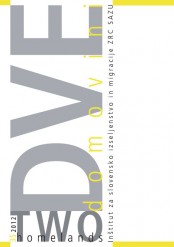Citizenship as Metaphor
Keywords:
citizenship, metaphors, changes in citizenship, era of globalisationAbstract
The aim of the paper is to analyse metaphors used in imagining forms of citizenship. It moves away from the conventional formula of researching citizens as metaphors in various contexts and introduces a new research perspective: relations between citizens as metaphors. It begins by outlining five major theoretical and methodological considerations relevant to a study of metaphors. The second part of the paper deals with complexities of change in citizenship concepts through metaphors from organic to body politic, mechanistic and multidivisional (regional, global, social, sexual, etc) in the era of globalisation.
Downloads
References
Aristotle (1996). The Politics and the Constitution of Athens. Cambridge: Cambridge University Press.
Black, Max (1962). Models and Metaphors: Studies in Language and Philosophy. Ithaca: Cornell University Press.
Banjac, Marinko (2010). Developing Tanzanian civil society: Desiring democracy, self-empowerment and the World Bank. Journal of Organizational Change Management 23(6): 669–688.
Foucault, Michel (1972). The Archaeology of Knowledge. London: Tavistock Publications.
Foucault, Michel (1990). The History of Sexuality: An Introduction. Volume 1. London: Vintage.
Gierke, Otto (1913). Political theories of the Middle Age. Cambridge: Cambridge University Press.
Hale, David George (1971). The Body Politic: A Political Metaphor in Renaissance English Literature. The Hague: Mouton.
Hobbes, Thomas (1651/1996). Leviathan, Cambridge: Cambridge University Press.
Kantorowitz, Ernst H. (1997). The King’s Two Bodies. Princeton: Princeton University Press.
Lakoff, George, and Michael Johnson (1980/2003). Metaphors We Live By. Chicago: University of Chicago Press.
Landau, Martin (1961). On the Use of Metaphor in Political Analysis. Social Research 28: 331–353.
Maasen, Sabine (1995). Who is Afraid of Metaphors? Biology as Society, Society as Biology: Metaphors (ed. Sabine Maasen, Everett Mendelsohn and Peter Weingart). Dodrecht: Kluwer Academic Publishers, 11–36.
Marshall, Thomas Humphrey (1950). Citizenship and Social Class. Cambridge: Cambridge University Press.
Miller, Charles A. (2003). Ship of State: The Nautical Metaphors of Thomas Jeff erson. Lanham, MD: University Press of America.
Pikalo, Jernej, Marinko Banjac, Blaž Ilc (2011). Meje globaliziranega sveta. Ljubljana: Sophia.
Poggi, Gianfranco (2003). Citizens and the state: retrospect and prospect. States & Citizens: History, Theory, Prospects. (ed. Quentin Skinner and Bo Strath). Cambridge: Cambridge University Press, 39–49.
Ricoeur, Paul (1981). The Rule of Metaphor. Toronto: University of Toronto Press.
Rončević, Borut and Makarovič Matej (2010). Towards the strategies of modern societies: systems and social processes. Innovation: The European Journal of Social Science Research 23(3): 223–239.
Scholte, Jan Aart (2005). Globalization: A Critical Introduction. 2nd edition. Basingstoke: Palgrave.
Seneca, Lucius Annaeus (1995). Moral and Political Essays. Cambridge: Cambridge University Press.
Shapiro, Michael J. (1985–86). ‘Metaphor in the Philosophy of the Social Sciences’. Culture and Critique 2: 191–214.
Toplak, Cirila, Mitja Velikonja, Jernej Pikalo, Peter Stankovič, Ksenija Šabec, Mirt Komel (2010). Europe of Homelands or Homeland Europe: (European) Identity Issues. Dve domovini/Two Homelands 33: 23–35.
Vodovnik, Žiga (2011). The performative power of translocal citizenship. Dve domovini/Two Homelands 34: 7–20.
Walzer, Michael (1967). On the Role of Symbolism in Political Thought. Political Science Quarterly 82: 191–204.
Wolin, Sheldon (1960). Politics and Vision: Continuity and innovation in Western Political Thought. Boston: Little Brown.
Zashin, Elliot and Philip C. Chapman (1974). The Uses of Metaphor and Analogy: Toward a Renewal of Political Language. The Journal of Politics 36: 290–326.
Downloads
Published
How to Cite
Issue
Section
License

This work is licensed under a Creative Commons Attribution-NonCommercial-NoDerivatives 4.0 International License.
Authors guarantee that the work is their own original creation and does not infringe any statutory or common-law copyright or any proprietary right of any third party. In case of claims by third parties, authors commit their self to defend the interests of the publisher, and shall cover any potential costs.
More in: Submission chapter





